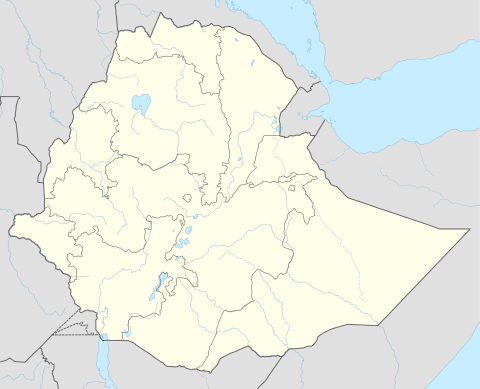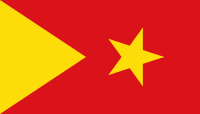Adigrat
| Adigrat (ዓዲግራት) | ||
|---|---|---|
| City | ||
|
View of Adigrat | ||
| ||
 Adigrat (ዓዲግራት) Location within Ethiopia | ||
| Coordinates: 14°16′N 39°27′E / 14.267°N 39.450°E | ||
| Country | Ethiopia | |
| Region | Tigray | |
| Zone | Misraqawi (Eastern) | |
| Woreda | Ganta Afeshum | |
| Area | ||
| • Total | 18.77 km2 (7.25 sq mi) | |
| Elevation | 2,457 m (8,061 ft) | |
| Population (2013) | ||
| • Total | 76,400[1] | |
| • Density | 3,703/km2 (9,590/sq mi) | |
| Time zone | EAT (UTC+03:00) | |
| Post Code | 20[2] | |
| Area code(s) | (+251) 34 | |
| Website | Official website | |
Adigrat (Ge'ez: ዓዲግራት) is a city and separate woreda in the Tigray Region (or kilil) of Ethiopia. Located in the Misraqawi Zone at longitude and latitude 14°16′N 39°27′E / 14.267°N 39.450°ECoordinates: 14°16′N 39°27′E / 14.267°N 39.450°E with an elevation of 2457 meters above sea level, below a high ridge to the west, Adigrat is the last important Ethiopian city south of the border with Eritrea, and is considered to be a strategically important gateway to Eritrea and the Red Sea. Adigrat was part of Ganta Afeshum woreda before a separate woreda was created for the city.
Sites of Interest
Adigrat, the capital of the Agame district, has an interesting aristocratic history. In town are the remnants of two castles from the Zemene Mesafint ("Era of Princes"),(ዘመነ መሳፍንት) one (pictured) owned by Dej Desta, the other by the Ras Sebhat Aregawi. Other sites of interest:
- 19th century Adigrat Chirkos - was strategically built on a hill near Dej Desta's castle, so that Desta could see the church from his bedroom balcony.
- A few years after World War II land was obtained in the centre of Adigrat at a site called "Welwalo". In view of the possibility that one day it might become a church, the "Holy Saviour" was built and used regularly as a parish church. After the establishment of the Ethiopian Catholic hierarchy in 1961 that church was destined to become the cathedral of the Eparchy of Adigrat. After appropriate modifications were made the formal and official consecration of the Cathedral Catholic of the Holy Saviour took place on 19 April 1969. It has an Italian design, but incorporates work by Ethiopian artist Afewerk Tekle.[3]
- Italian War cemetery commemorates some 765 Italian soldiers who died between 1935 and 1938.[3]
- Adigrat also hosts a market, and a newly constructed community park.
History

Adrigrat first acquired importance when Ras Sabagadis made it his capital in 1818; it declined in importance after his death in 1831, although the missionary Samuel Gobat had joined countless Ethiopians in fleeing there for safety in the days immediately after Sabagadis' death.[4] When the missionary Johann Ludwig Krapf passed through Adigrat in April 1842, "almost the whole is in ruins", and observed that a nearby village, Kersaber, was "much larger than Adigrate."[5] According to Sven Rubenson, 1868, Ras Kassai (later the Emperor Yohannes IV), met with Sir Robert Napier at Adigrat, where he agreed to provide support for the British expeditionary force.[4]
During the First Italian-Abyssinian War, the Italians occupied Adigrat on 25 March 1895, and used it as a base to support their advance south to Mek'ele. General Antonio Baldissera refortified the settlement after the Italian defeat at the Battle of Adowa, but Emperor Menelik II insisted on its surrender at the beginning of the peace talks that concluded the war; Baldissera was ordered to evacuate Adigrat, which he did 18 May 1896. Augustus B. Wylde a few years later described Adigrat as having a Saturday market of medium size.[6]
The Italians again occupied Adigrat, without resistance, at the beginning of the Second Italian-Abyssinian War 7 October 1935. The Italians were met there on the 11th by Ras Haile Selassie Gugsa, who had been courted by the Italians to ignite a widespread defection of the Tigrean aristocracy; instead, he had been soundly defeated a few days before by Dejazmach Haile Kebbede of Wag, and presented himself to the invaders with only 1200 followers. Anthony Mockler notes that despite the fact the young Ras shook Ethiopian morale, "this was the first and last open defection to the Italians of an important noble and his men."[7]
Adigrat was captured by rebels in the Woyane rebellion 25 September 1943, forcing the Ethiopian government administrators to flee to neighboring Eritrea. By 1958 the city was one of 27 places in Ethiopia ranked as a First Class Township.[4]
By the 1970s, Adigrat possessed the only high school east of Adwa and north of Mek'ele, Agazi Comprehensive High School, and together with the town's Catholic junior high school, they became centers of anti-government dissent. The presence outside of town of a large military base, served as a focus for protesting students, and also as a source for their hopes of a military coup. During the first years of the Ethiopian Civil War, the fledgling Tigrayan People's Liberation Front drew support from these groups.[4] Derg forces took Adigrat during their Operation Adwa in summer 1988. The same day that the Third Revolutionary Army was crushed at Battle of Shire, 19 February 1989, government troops and officials evacuated Adigrat.[8] According to Africa Watch they caused widespread destruction in the town before they left.[4]
Demographics
.jpg)
Based on the 2007 national census conducted by the Central Statistical Agency of Ethiopia (CSA), this town has a total population of 57,588, of whom 26,010 are men and 31,578 women. The majority of the inhabitants said they practiced Ethiopian Orthodox Christianity, with 94.01% reporting that as their religion, while 3.02% of the population were Catholics, and 2.68% were Muslim.[9]
The 1994 census reported it had a total population of 37,417 of whom 17,352 were men and 20,065 were women..
Economy
The largest pharmaceutical manufacturing plant in Ethiopia, Addis Pharmaceuticals Factory SC, is located in Adigrat. Opened in 1992, it has an annual production capacity of 1.2 billion tables, 19 billion ampoules, 10 million vials, 500,000 capsules, 4 million ointment tubes and 9.6 million bottles of syrup. Addis Pharmaceuticals is one of the 13 companies owned and managed by the Endowment Fund for the Rehabilitation of Tigray (EFFORT).[10]
The Commercial Bank of Ethiopia also constructed a large branch office in Adigrat.[11]
Education

Adigrat is home to the Adigrat University established in May 2011. The University consists of the Colleges of: Engineering and Technology, Natural and Computational Sciences, Agriculture and Environmental Sciences, Business and Economics and Social Sciences and Humanities.[12] The first high school in Adigrat was Agazi Comprehensive High School which was established in the 1950s.[13]
Transportation
Adigrat is located along Ethiopian Highway 2, which connects the city with Addis Abeba and Mekelle. In Adigrat, Ethiopian Highway 2, turns off the main highway to the west in the direction of Adwa. To the north of Adigrat, Ethiopian Highway 20 connects the city to Kokobay and to Asmara in Eritrea.
Notable inhabitants
- Yohannes Haile-Selassie, paleoanthropologist
- Miruts Yifter, Olympic gold medal winning long distance runner
- Seyoum Mesfin, politician and diplomat
Notes
- ↑ "Adigrat City Population". City Population. Retrieved 16 July 2015.
- ↑ "Adigrat Postal Code". Geopost Codes. Retrieved 16 July 2015.
- 1 2 Frances Linzee Gordon, Jean Bernard Carillet Ethiopia and Eritrea (Lonely Planet, 2003) pp. 168f.
- 1 2 3 4 5 "Local History in Ethiopia" (pdf) The Nordic Africa Institute website (accessed 16 December 2007)
- ↑ Journals of the Rev. Messrs. Isenberg and Krapf, Missionaries of the Church Missionary Society, Detailing their proceedings in the kingdom of Shoa, and journeys in other parts of Abyssinia, in the years 1839, 1840, 1841 and 1842, (London, 1843), p. 513
- ↑ Augustus B. Wylde, Modern Abyssinia (London: Methuen, 1901), p. 494
- ↑ Mockler, Anthony (2003) [1984]. Haile Selassie's War. New York: Olive Branch. pp. 61ff. ISBN 1-56656-473-5.
- ↑ Gebru Tareke, The Ethiopian Revolution: War in the Horn of Africa (New Haven: Yale University, 2009), p. 284
- ↑ Census 2007 Tables: Tigray Region, Tables 2.1, 2.4, 2.5 and 3.4.
- ↑ "Addis Pharmaceuticals Factory SC" Archived June 14, 2011, at the Wayback Machine., EFFORT website
- ↑ "Commercial Bank of Ethiopia Branch Offices". www.combanketh.et/. Commercial Bank of Ethiopia. Retrieved 8 July 2015.
- ↑ "Adigrat University". http://www.adu.edu.et/. Adigrat University. Retrieved 8 July 2015. External link in
|website=(help) - ↑ "Agazi School Alumni Association". Agazi School Alumni Association-North America. Agazi School Alumni Association. Retrieved 8 July 2015.
External links
| Wikivoyage has a travel guide for Adigrat. |
![]() Media related to Adigrat at Wikimedia Commons
Media related to Adigrat at Wikimedia Commons
- John Graham, "Tigray - Axum and Adua - Part 1" (Addis Tribune)

